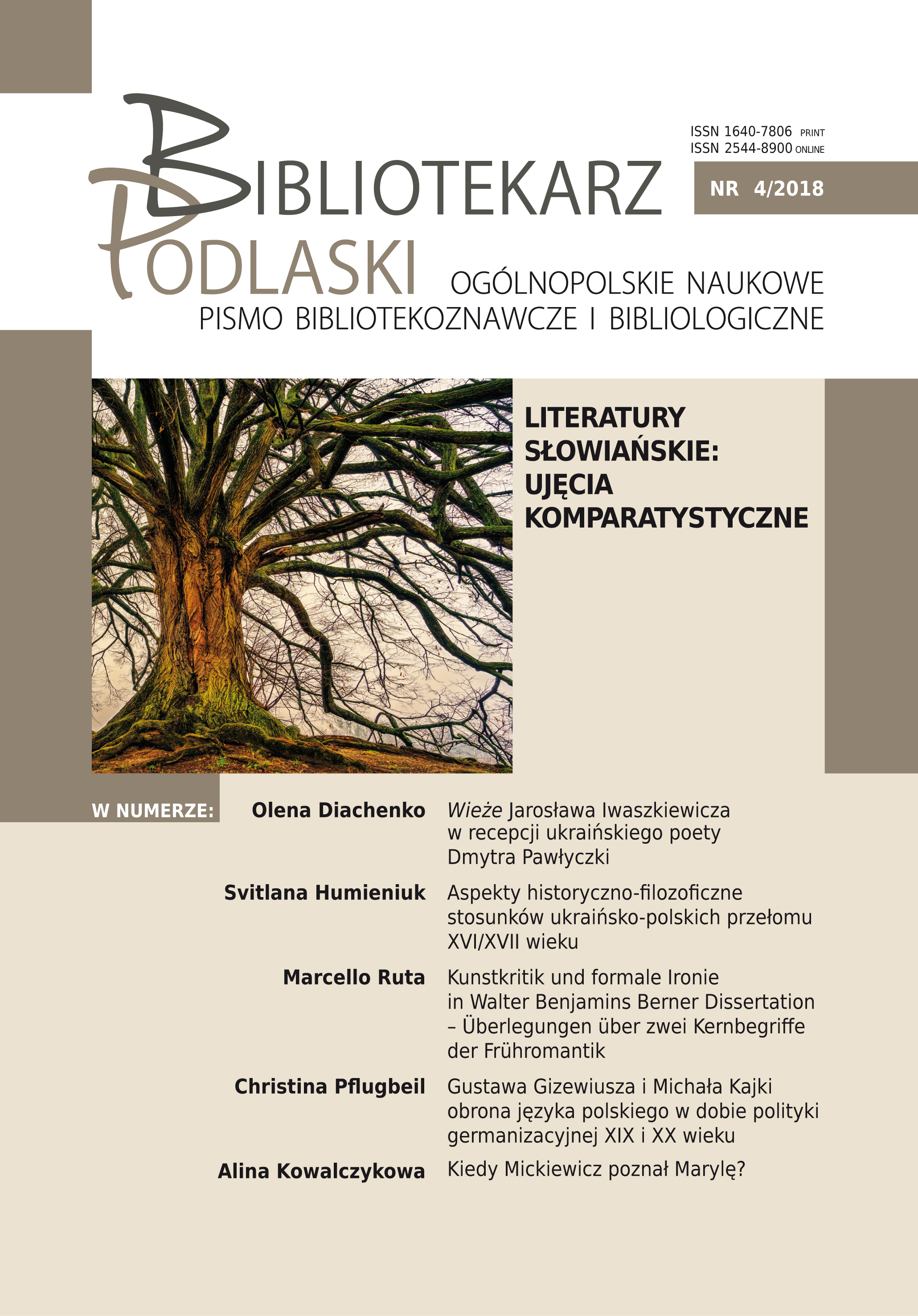Abstract
The subject of a research observation presented in the article is an original aristocratic profile of Zuzanna Ginczanka (proper name: Zuzanna Polina Gincburg, 1917–1944). She was a Polish, Jewish-origin poet who had her debut in Warsaw in the 1930s. During World War II she became one of the Holocaust victims. The legend of Ginczanka is focused on her tragic fate and early death at the age of 27. Nonetheless, her poetic work deserves our attention. It has recently been appreciated by researchers. Poliszczuk deliberates on Ginczanka’s artistic and sexual identity crisis, so explicitly expressed in her work. Ginczanka’s linguistic and cultural orientation inclines her to choose the Polish nationality. Racial persecution suffered by the poet as well as the need to explore her roots directed her towards the Jewish culture. However, the language used in her family linked her with the world of Russian culture, which she treated with distance. Anyway, Zuzanna Ginczanka felt a sort of „heroic betrayal”, both in terms of her origin and language. At present, her original profile again intrigues researchers and commentators, and the artist’s poetry is also worth perceiving as a special kind of cultural palimpsest.
References
Araszkiewicz Agata, „Wypowiadam wam moje życie”. Melancholia Zuzanny Ginczanki, Warszawa 2001.
Cioran Emil, Dogodności i niedogodności wygnania, przeł. Witold Gombrowicz, „Kultura” 1952, nr 6.
Foto: http://culture.pl/pl/tworca/zuzanna-ginczanka.
Ginczanka Zuzanna, Wiersze zebrane, oprac. Izolda Kiec, Warszawa 2014.
Іlnickijj Mikola, Drama bez katarsisu. Storіnki lіteraturnogo zhittja Lvova pershoї polovini XX stolіttja, Lvіv 1999.
Inglot Mieczysław, Polska kultura literacka Lwowa lat 1939–1941. Ze Lwowa i o Lwowie. Lata sowieckiej okupacji w poezji polskiej. Antologia utworów poetyckich w wyborze, Wrocław 1995.
Janion Maria, Kobiety i duch inności, wyd. 2, Warszawa 2006.
Kiec Izolda, Zuzanna Ginczanka. Życie i twórczość, Poznań 1994.
Kotarba Ryszard, Zuzanna Ginczanka: śmierć poetki. Historia okupacyjna, „Gazeta Wyborcza”, 14 grudnia 2015 roku, http://wyborcza.pl/alehistoria /1,121681,19333036,zuzanna-ginczanka-smierc-poetki-historia-okupacyjna. html?disableRedirects=true [dostęp: 09.08.2018 r.].
Łopuszański Piotr, Warszawa literacka w okresie międzywojennym, Warszawa 2017.
Mick Christoph, Lwów pod sowieckim panowaniem, 1939–1941, [w:] Stalin i Europa. 1928–1953, oprac. Timothy Snyder, Ray Brandon, przeł. Sławomir Kędzierski, Poznań 2014, s. 131-149.
Stępień Marian, Wśród emigrantów, Kraków 2007.
Wat Aleksander, Mój wiek. Pamiętnik mówiony, cz.1, rozmowy prowadził i przedmową opatrzył Czesław Miłosz, Warszawa 1990.
Welsch Wolfgang, Transkulturowość. Nowa koncepcja kultury, [w:] Filozoficzne konteksty koncepcji rozumu transwersalnego. Wokół koncepcji Wolfganga Welscha, cz. 2, red. Roman Kubicki, Poznań 1998, s. 195-223.
Wojda Dorota, „Sprawy korzenne”. Fenomenologia Zuzanny Ginczanki, „Przestrzenie Teorii” 2017, nr 28, s. 269-280.
Żydzi w literaturze. Materiały XII konferencji pracowników naukowych i studentów, red. Anna Szawerna-Dyrszka, Maciej Tramer, Katowice 2003.
Articles published in the “gold open access” mode on the basis of a non-exclusive license agreement between the publisher and the author. Permitted use:
- the publication may be read and stored on any device,
- the publication may be cited (with obligatory reference to the author, the title of the text, as well as the full title, bibliographic address of the issue and page of the journal)
The editorial team of “Bibliotekarz Podlaski” implements an open access policy by publishing materials in the form of the so-called Gold Open Access. From volume 42 (issue 1/2019), the journal is available under the Creative Commons license (Attribution – ShareAlike: CC BY-SA).
The key declarations of the Open Access and Open Science movement, which we fully support, are available on the CEON Open Science website.
COPYRIGHT:
The editorial team of “Bibliotekarz Podlaski” implements an open access policy by publishing materials in the form of the so-called Gold Open Access. The journal is available under the Creative Commons license – Attribution – ShareAlike 4.0: International: CC BY-SA 4.0).
The key declarations of the Open Access and Open Science movement, which we fully support, are available on the CEON Open Science website.
“Bibliotekarz Podlaski” allows its readers to read, download, copy, distribute, print, search and link to the full content of articles. We enable full, immediate, unlimited (both in a territorial, temporal and technical sense) open access to all published content, in accordance with the principle that freely available research increases and accelerates the global development of science and the exchange of knowledge.
The editorial team of “Bibliotekarz Podlaski” encourages authors to place articles published in the journal in open repositories (after the review or the final version of the publisher), provided that a link to the journal’s website is provided.
The journal does not charge the authors any fees for accepting and publishing their texts.

